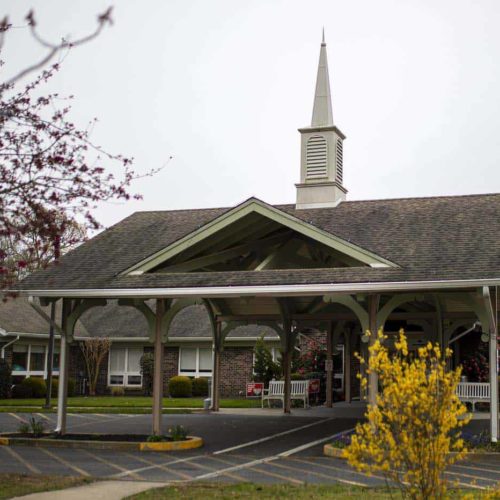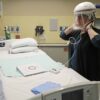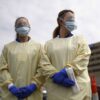This article is published in partnership with the Philadelphia Inquirer
Introduction
Over a month ago, employees of a North Cape May, New Jersey, nursing home say they noticed frail residents coughing and, one after another, growing weak with fevers.
“This one got it. Then that one got it,” said a worker at the 120-bed Victoria Manor facility.
The worker suspected that respiratory ailments among residents could be COVID-19, rather than the flu for which residents were being tested. At the time, New Jersey was quickly discovering coronavirus cases and by March 12 had started shutting down schools and public gatherings.
But the Victoria Manor worker and a second one, both of whom requested anonymity out of fear of reprisal, told the Center for Public Integrity the facility seemed to play down the threat of COVID-19, the disease caused by the coronavirus. They complained that it wasn’t until March 26 that all employees in patient care areas, including janitors and food service staff, were required to wear protective masks and gowns.
When entering rooms of residents who appeared very ill, the second worker said, employees felt like “lambs led to slaughter.” As of Monday, Victoria Manor had 52 coronavirus cases and nine deaths. (Update, April 27, 2020: 12 Victoria residents have now died of COVID-19.)
The Victoria Manor experience illustrates how senior-care facilities followed federal coronavirus advisories differently and could have contributed to the spread of COVID-19 through America’s nursing homes, where an estimated 7,000 people have died of the virus. And it shows how employees at these facilities — often poorly paid, female and people of color — have largely felt powerless as the pandemic has exploded.
Pennsylvania-based Genesis HealthCare operates Victoria Manor and 386 other care centers across 26 states.
During a March 17 call with investors, Genesis HealthCare’s chief medical officer, Richard Feifer, said, “At this time, we have a single confirmed case of COVID-19 in one of our 387 centers. Rest assured, we are working diligently to minimize any potential spread, but we are also preparing [in case] any more of our facilities experience the coronavirus.”
But as the coronavirus swept the country, numerous Victoria Manor residents fell ill. By this week, Genesis HealthCare had at least 458 positive coronavirus cases and 82 deaths in its New Jersey facilities, including Victoria Manor.
The company’s website includes a timeline of anti-COVID-19 measures it says it has taken since January. In the preface to that timeline, Genesis HealthCare says it has followed “recommended protocols and guidelines from the Centers for Disease Control and Prevention (CDC), and Centers for Medicare and Medicaid Services (CMS), often getting out in front of them.”
Public-health experts believe that delays in manufacturing personal protective equipment and in producing and distributing tests share responsibility for the spread of COVID-19. Asymptomatic employees can carry the virus, unknowingly, into facilities. State and local officials left to coordinate testing have urged the Trump administration to order companies to ramp up production of materials for tests and processing and do more to ensure testing increases.
Experts also are also urging special attention to nursing-home workers and the up to 1.5 million residents nationwide in their care.
“We need to test everybody who works within a nursing home within the next week,” Andy Slavitt, a former acting CMS administrator during the Obama administration, said April 13 on MSNBC. Slavitt said testing all nursing-home workers would save lives. So far, it’s been left up to states to test such workers. West Virginia Gov. Jim Justice, R, has already ordered. testing of all nursing home residents and employees.
On March 11, the World Health Organization declared COVID-19 a pandemic. By March 18, officials in Cape May County, on the state’s southern tip, reported its first positive test, a visitor from New York City. By March 31, Genesis HealthCare says, Victoria Manor officials learned that a resident had tested positive.
The company says it reported that test immediately to county and state health officials. In response to written questions from Public Integrity, Genesis HealthCare did not address the two workers’ allegations that residents earlier in March were suffering respiratory problems that could have been COVID-19.
It was also on March 31 that a Victoria Manor employee contacted Public Integrity.
“I don’t know what to do or where to turn. I don’t doubt I have seen many residents and employees with symptoms,” said the employee, who hadn’t been at work for several days.
The worker wasn’t aware a Victoria Manor resident had tested positive at that point. As of mid-April, the worker still hadn’t been tested for COVID-19.
On Wednesday, New Jersey health officials said nearly 11,530 coronavirus cases had been reported by the state’s nursing homes. Nearly 2,050 nursing home residents had died — 43 percent of more than 4,750 COVID-19 deaths in the state by that date.
Powerless, as deaths rise
On the night of April 6, George Lees, 86, became the first known Victoria Manor resident to die from COVID-19.
The next day, Cape May County announced on its website that 15 Victoria Manor residents and 11 employees had tested positive. By April 14, the county disclosed that eight Victoria Manor residents had died among 26 residents who had tested positive. Twenty-four employees had also tested positive.
Meanwhile, some of Victoria Manor’s sister facilities in other states were experiencing outbreaks.
On April 6, according to a WFMZ-TV in Pennsylvania, Genesis HealthCare reported that that a combined 49 residents and staff in its Lehigh Center facility in Macungie, Pennsylvania, had tested positive. Two residents had died.
By April 11, seven Lehigh residents were dead. Fifty-one residents and 26 employees had tested positive. On April 14, The Baltimore Sun reported that at Genesis HealthCare’s Loch Raven Center nursing home in Parkville, Maryland, 47 cases of the virus had been confirmed and four residents had died.
And on April 15, Maryland’s WBOC-TV reported that 12 residents at Genesis HealthCare’s Milford Center in Milford, Delaware, had died, with dozens of residents and employees symptomatic or positive for the coronavirus.
Back in Cape May County, officials last week removed official web posts disclosing counts of Victoria Manor’s positive tests and deaths. A county official said state officials had advised the county that details in the posts could violate the victims’ privacy. On Monday, however, New Jersey published a list of individual nursing home coronavirus cases and deaths.
United Food and Cannery Workers Local 152, a union representing many Victoria Manor workers, says Genesis HealthCare told the union March 31 that a resident had tested positive.
But Peggy Kelly, director of the union’s field services, said she learned of subsequent positive tests among residents and employees not from the nursing home company, but from news reports.
“I shouldn’t have to turn on the news to find this out. The employees have a right to know about positives,” Kelly said. In a statement, Genesis HealthCare said the union and the company agreed “to have approximately one call per week [on COVID-19 developments], and those communications have occurred as planned.” The two Victoria Manor workers told Public Integrity they were concerned that fellow employees were still working while showing cold-like symptoms in early March. They say they discussed, with co-workers, the possibility that residents were ill with the virus. One worker contacted the union in early March with concerns, the worker says, that COVID-19 “could be in the building.”
“I shouldn’t have to turn on the news to find this out. The employees have a right to know about positives.”
Peggy Kelly, director of FIELD SERVICES for a union representing many Victoria Manor workers
Kelly, the union representative, told Public Integrity she heard concerns from workers that workers and residents might have the virus before the March 31 positive test was disclosed to her. Kelly said the same day the company informed her a resident tested positive — March 31 — Genesis HealthCare also told her without explanation that it had replaced Victoria Manor’s top administrator.
The company declined to discuss the matter with Public Integrity.
In other parts of the country, lesser-paid employees of other nursing home companies — among them aides, cleaners, receptionists and maintenance employees — have complained of feeling information-starved.
In Riverside, California, nursing aides refused to go to work at a facility with dozens of infections.
In Chicago, nursing aide Tainika Somerville said: “I had to find out on social media that a resident I took care of passed away from complications of COVID-19.”
In Kentucky, nursing aide Pamela Hughes died of the virus on April 13.
Dire warnings to nursing homes
In mid-March, the CDC issued a stark warning for nursing homes to be “proactive” in response to COVID-19.
A CDC report published March 18 found that at Washington state’s Kirkland Life Care Center, asymptomatic workers could have spread coronavirus to other area nursing homes where they worked. From February and into March, coronavirus infected 129 residents, visitors and staff at Kirkland, and 40 deaths were linked to the facility.

“Long-term care facilities should take proactive steps to protect the health of residents and preserve the health care workforce by identifying and excluding potentially infected staff members and visitors, ensuring early recognition of potentially infected patients, and implementing appropriate infection control measures,” the CDC report warned.
Genesis HealthCare says it began alerting its facilities in January that it was preparing for a potential coronavirus attack, according to its timeline of initiatives.
“When we first recognized symptoms at Victoria Manor, we requested testing kits from our laboratory partner,” spokeswoman Lori Mayer said in a statement to Public Integrity. “It took many days to get access to those kits. At this time, patient and resident testing has improved as we have been able to partner with a new lab to provide a 24-hour response time.”
Public Integrity asked Genesis HealthCare if it told county health officials that staff had observed respiratory problems among residents before the company confirmed its first positive test on March 31.
“We are required to report confirmed cases to the Department of Health,” Mayer said in a written response. County officials did not respond to inquiries about the precise date the county learned of illnesses at the care home.
A March 13 COVID-19 memo issued by CMS warns: “Facilities experiencing an increased number of respiratory illnesses … among patients/residents or healthcare personnel should immediately contact their local or state health department for further guidance.”
New Jersey law , according to guidance from the State Department of Health, also “mandates that long-term care and other institutional facilities immediately report any known or suspect communicable disease outbreak, by phone to the local health department (LHD) with jurisdiction over the facility.”
In its now-deleted April 6 post about Victoria Manor, Cape May County said that when positive test results were confirmed, the county delivered 400 surgical masks and 200 gowns to the nursing home.
On March 23, a CMS report found that Kirkland officials failed to “notify the Washington State Department of Health “about the increasing rate of respiratory infection among residents.” The center faces more than $611,000 in fines, according to the Washington Post.
Company initiatives to thwart virus
In early February, according to the Genesis HealthCare coronavirus timeline, the company began increasing its supply of protective equipment. Among the items: face masks, gowns, eye protection and N95 respiratory masks, which are more effective than surgical masks at blocking gusts of breath containing the virus.
As of Feb. 18, “key clinical personnel” were fitted for N95 masks, the company says. And on March 3, signs were posted to “discourage” visitors with suspicious symptoms or those who knew they’d been exposed to a coronavirus-positive person or been an outbreak area.
By March 10, anyone entering facilities was required to have temperatures taken, a policy stricter than new guidance from CMS for offering voluntary temperature checks, according to the timeline. The same day, Genesis HealthCare says it imposed a “no visitation” policy in facilities in regions with “community spread” and began restricting “communal” activities in homes. To preserve its supply of face masks, it began mandating reuse of masks in all facilities on March 18.
We can’t do this work without your support.
Then, on March 23, it ordered “universal mandatory use of face masks and eye protection in outbreak hot spots.”
But southern New Jersey was not considered a hot spot at that time, according to Mayer, the Genesis HealthCare spokeswoman. Asked to explain how the company reached this decision, Mayer said by email that the decision was “based on the [New Jersey] department of health.”
A ‘safe place’?
On March 26, according to Genesis HealthCare’s timeline, “All staff in patient care areas began wearing universal face mask and eye protection at all times” inside all company facilities.
Three days earlier, Kelly says, the union asked the company to respond to complaints from workers that they had to ask for gowns, Kelly said. She said the union “verified” that the company had “plenty” of gowns available on March 24.
Before that point, however, the use of masks and gowns at Victoria Manor was inconsistent, the two workers who spoke to Public Integrity say.
“We weren’t protected when they [the residents] were getting fevers and pneumonia, and we were going into their rooms,” one said. “Whatever they had out, that’s what you wore.”
The other facility worker who spoke with Public Integrity described a conversation in March with Lees, the resident who died April 6.
The worker, who cried during the interview with Public Integrity, recalled Lees remarking that it seemed “bad out there” because of the virus. The worker tried to reassure him, saying “If anything, you are in a safe place.”
The other worker said there are now signs on rooms at Victoria Manor with known coronavirus-positive residents inside, and that staff are now wearing N95 masks and gowns. But the worker fears more employees and residents will test positive for the virus.

‘Testing, testing, testing’
In line with national practices, Victoria Manor isn’t required to test its own employees for coronavirus.
But Genesis HealthCare told Public Integrity in one of its statements, “We are broadly appealing to government officials for their assistance in faster, broader testing.”
Like other nursing-home workers in the United States, Victoria Manor employees must seek tests with private providers or at county testing sites, with costs covered by employees’ insurance.
On April 6, Cape May County announced it was opening a drive-through COVID-19 testing site once a week, by appointment and with a screening process to justify a test. Applicants must have symptoms, a prescription from a doctor or other supporting evidence they’ve been exposed to the virus.
In an April 15 statement, Genesis HealthCare said Victoria Manor has provided workers notes to give to their personal physicians explaining “they are a health care professional and could have been exposed to COVID-19.”
“If an employee was not symptomatic,” the company’s April 15 statement says, “many community physicians will not test despite the note. The New Jersey Department of Health is not testing employees at this time.”
The two Victoria Manor workers who spoke to Public Integrity said they wish testing had been more widely available and come sooner. “We should have been testing, testing, testing,” one said.
Read more in Health
Coronavirus and Inequality
New bill attempts to ensure people with disabilities get equal ventilator access
Following Center for Public Integrity investigation, Sen. Ben Sasse writes bill aimed at preventing disability discrimination during the coronavirus pandemic




Join the conversation
Show Comments